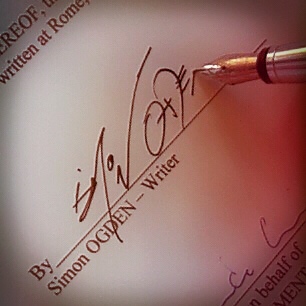A native Vancouverite, Daniel got himself a Masters Degree in Sociology in New Zealand before returning home to study acting. In 1999 he and friend David Mott co-founded the Upintheair Theatre Society and have been going strong ever since. They had a recent hit play with 120bpm, a site-specific work about Vancouver’s underground rave scene, mounted in a warehouse at a secret location. Each audience member was given a street corner to wait on, and was then met by a member of the company and guided to the event. Pretty cool, eh?
Upintheair is also responsible for the annual Walking Fish Festival on Granville Island, a showcase of new work by emerging artists. These guys are taking their responsibility to our theatre seriously.
1.) In one word, describe your present condition.
Hopeful.
2.) With as many words as you need, describe the present condition of the Vancouver theatre scene.
More talent than opportunity. More ideas than money.
3.) Why theatre, and why in Vancouver?
It seemed more exciting than Sociology. No, honestly, theatre because nothing makes me feel like I am doing exactly what I want with my life like being in a room creating or rehearsing a show with people I respect and want to work with. And Vancouver because this is where the people I want to live with are.
4.) In terms of choosing material, how do we ensure that our theatre is relevant?
Know Thy Audience.
5.) In your experience, what is the biggest advantage and biggest disadvantage to putting up site-specific theatre?
It’s cheap and produces fantastic originality and creativity. But no one knows where to find it. And theres no lighting rig.
6.) Is it possible for the indie theatre community to work together as a whole to market and promote itself?
I doubt it. I think it is too difficult, especially when you have groups that are ad-hoc, or one offs – how do you co-ordinate in a meaningful, ongoing, manner? On the other hand, See Seven has shown that you can do it successfully, but you need a core of operating organizations and determined individuals to carry the brunt of the load.
7.) What has been the largest obstacle in developing your own theatre company?
Not having enough money to pay artists.
8.) Where will Van theatre be in 5 years?
Somewhere similar to where it is now, and wondering how we got so little out of the Olympics.
9.) What did you think of the Open Space?
It was one of the most inspirational events of the last year.
10.) What are your top 3 theatre reads?
Tom Stoppard’s Arcadia, David Mamet’s True and False, William Ball’s A Sense of Direction.
11.) What’s next?
Upintheair Theatre’s new creation, Johnny Grant. It’s based on the life of my great-great-great grandfather, John Francis Grant, a Metis Mountainman. We will be work-shopping the new script in the summer and producing in the winter of 2008/09. It’s a two man show, created and performed by myself and Dave Mott, directed by Heidi Taylor, and it’s gonna have puppets and multi-media and music and dancing. We are very excited about it.



7.) What has been the largest obstacle in developing your own theatre company?
“Not having enough money to pay artists.”
Paying artists more isn’t going to solve the problem in any long-term way, nor is it going to create a robust foundation on which to build your company.
I am growing weary of this assumption that the only people involved in making theatre are capital “A” artists.
Artists are only a part of the picture.
And it’s this same assumption that leads to the creation of theatre companies made up exclusively of actors and directors. It’s like trying to run a hospital that’s made up entirely of doctors. Who’s going to answer the phones? Balance the books? Order supplies? Drive business development?
Many artists are underpaid. True. But simply throwing money at them isn’t going to address the independent theatre industry’s core problems. Is say fix your business model and the money will come.